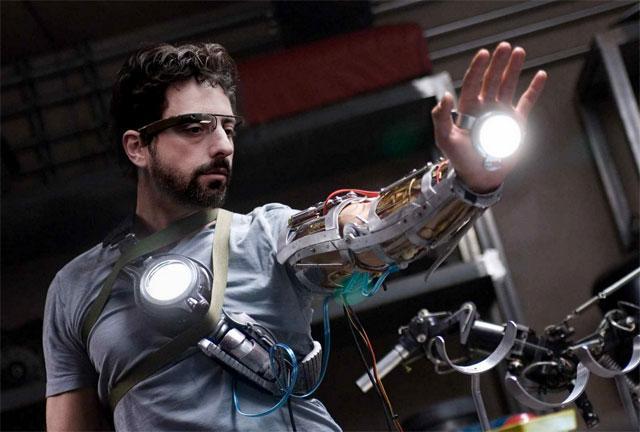
Yesterday, our news magnet Alex Wagner confirmed something very exciting. The $1,500 Explorer Edition of Google Glass took a mosey through the FCC under the code name “XEB.” Needless to say, it’s a great time to be a Google employee indeed. And even a better time to be one of the lucky few who pre-ordered at last year’s Google I/O. The Explorer Edition’s tricks will be limited to Bluetooth 4.0 LE, a 2.4GHz 802.11 b/g Wi-Fi radio, and a vibrating element that will emit sound through vibration to the head. All the while covering only one eye and providing a pop-up information display for notifications, Play content, and the like.
Reading more into the mysterious vibrating element led me to Google’s recent application of a patent for a “Wearable Computing Device with Indirect Bone-Conduction Speaker.” The vibrating element would be fitted on the inner frame of Glass and provide the wearer with mono output – perfect for phone calls. Curiously, a microphone is absent in the FCC filing but Google’s own Sergey Brin has confirmed Glass will pack a mic along with a camera, gyroscope, and speaker.
We are edging closer by the minute to the next wave of tech. The question is: are we ready for it?
If CES 2013 taught us anything, it’s that we are inviting technology into our lives at a rapid pace. Some pundits argued that CES was more a showcase of smart homes and the adaptation to smart lifestyles than anything else. It was no surprise then that the mobile world was left relatively undisturbed with no groundbreaking announcements in Las Vegas. I wasn't expecting anything to top Verizon’s announcement of 4G LTE and the myriad of devices capable of picking up Big Red’s 700MHz LTE frequency at CES 2011 anyway.
Despite all of this, Google Glass has the potential to fill more of a void then we might think. If the recipient of the Explorer Edition tests the prototype unit enough, could we be looking at a release date within the year? That’s a tough call, but based on what we know about the current mobile industry, I’m leaning towards no. From a practical standpoint, we are just beginning to see new wearable tech. After all, it’s only the Explorer Edition passing through the FCC, not the mainstream model we so desperately desire. And it’s likely nowhere near the final build available for mass distribution. But it can’t hurt to wonder.
Having said this, I’m surprised how easily Glass could fit into 2013 if Google decided to make an off-the-wall announcement at Google I/O later this year. Just because it would stick out in the current lineup of 5-inch displays, smart watches, and companion smartphones like the HTC Mini, that doesn't mean Glass can’t fit into this year’s wearable devices. Glass promises to change the way we view notifications and our overall reception of visual stimuli. Add a third layer to the display and you have the missing piece CES presented: connectivity. We are finding more reasons to remain connected than to stay disconnected. It’s even considered a part of life in Germany. And we know Bluetooth 4.0 LE (low energy, or BLE) is tech that is not yet capable of running on the latest version of Android. Simply put, if the Explorer Edition of Google Glass made its way through the FCC with BLE, why would Google have an operating system that couldn't support it? The answer is Google could announce support for it and we’d be just a bit closer to justifying our need for Glass at any minute.

On the opposite end of the spectrum, the die-hard early adopter would argue that we deserved Google Glass when we first caught hold of the tech a year and a half ago. Despite the constant development of mobile operating system software, we simply deserve the latest innovation if it exists. If we don’t get it, manufacturers are presumed to be stalling. I can understand why our desire for the latest is justifiable; we are becoming adept at learning new gestures and operating systems due to the frequency of which manufacturers like Apple and Google are developing them.
There will always be areas to improve on the software front, but, from a purely functional standpoint, our devices are somewhat limited in this regard. However, hardware is a recent trend facilitated by items like the FitBit, the Pebble Smartwatch, and Vuzix that are pushing our desire to stay connected to the limit. Where does that leave manufacturers, then? We consumers are left with new ways to obtain information, manage notifications, and streamline it all into an understandable feed. And manufacturers are just gracing the cusp of their next market: wearable tech.
If I had my way with it, I’d say release Google Glass when enough manufacturers see the benefits of it as an accessory. If it complements smartphones to the extent that one doesn't make sense without the other, make it. Are we there yet? No, but we’re close.
I’m interested to hear your thoughts on wearable tech, Dear Reader. Does it make sense to release something as innovative as Google Glass this year? Would you consider it regardless of price, or does it not suit your lifestyle? I could definitely fit some Glass from El Goog into my wish list this year, but your thoughts matter folks! Let me know in the comments below.